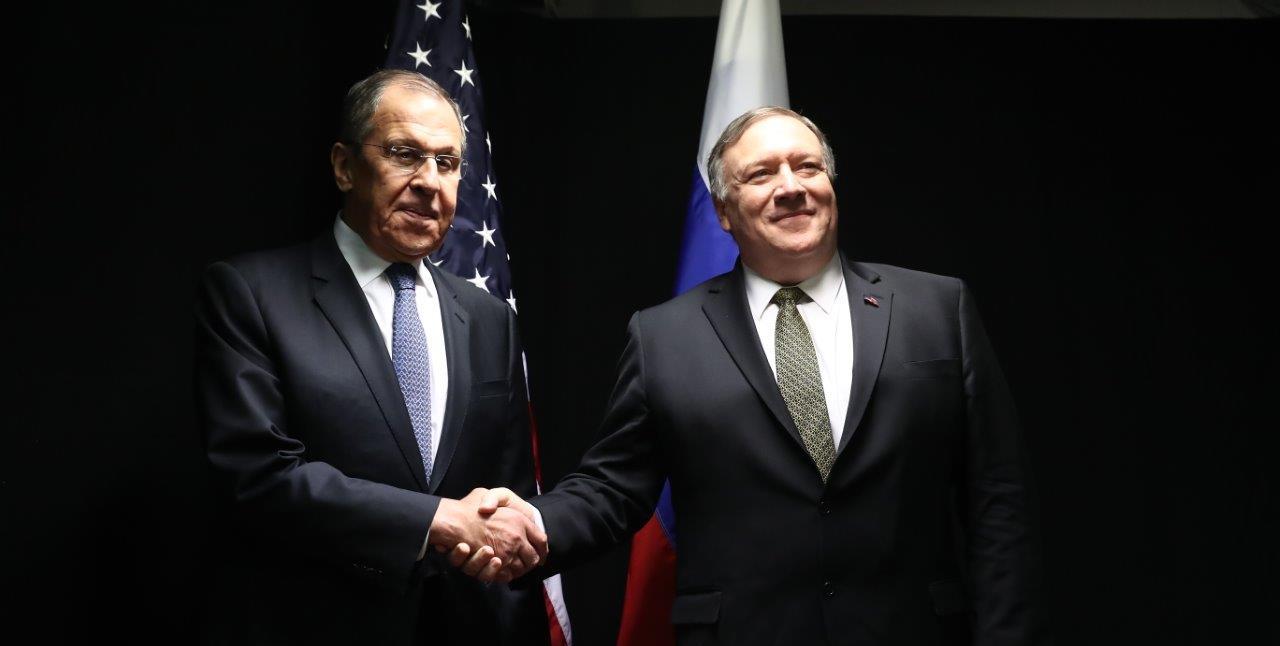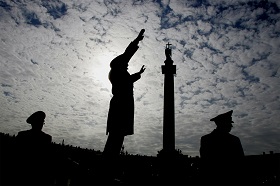As a long-standing member of the Valdai Discussion Club, I have the privilege of being there in person when the President of the Russian Federation gives his annual “Sochi” speech. As a rule, these speeches mainly touch upon foreign policy and are directed, urbi et orbi, at both Russian and foreign experts, journalists and politicians. One advantage of being at the meeting is that it gives attendees the opportunity to not only evaluate the content of the president’s words, but also to pay attention to his inflections, gestures and other features that provide an insight into his emotional disposition.
Since this year’s Meeting of the Valdai Discussion Club was dedicated to the East in the broad sense of the word, the West was not at the forefront of the Russian leader’s mind. However, the few times that it was mentioned, I got the sense that, quite untypically for the Russian narrative, he was not dwelling too much on the countless slights that the United States and the European Union had inflicted upon Russia.
Resentment is a widespread phenomenon in world politics. The Baltic countries have a gripe with Moscow. South Korea feels affronted by Japan. Vietnam is full of resent for China. Pakistan has long-standing issues with India. Resentments have built up U.S.–Europe relations. And the people of the Balkans and the Middle East resent everyone, from their own neighbors to humankind as a whole. Resentments in international relations can be caused by any number of factors – historical, economic, military-strategic, diplomatic, cultural and anthropological, and countless others (as far as I am aware, a detailed and comprehensive classifier of international grievances has yet to be compiled). While states, as well as people, do become offended from time to time, it often happens that they feign resentment, condemning others and playing the victim.
We could argue for hours about whether or not Russia has the right to be offended, but listing our grievances has long become part and parcel of Russia’s foreign policy narrative. For years, this narrative has taken a central place in the speeches of Vladimir Putin and other Russian leaders at the Valdai meetings in Sochi. Until this year, when Russia’s grievances all but disappeared from the president’s speech.
On the other hand, normal human interaction tells us that resentment is not a constructive feeling. As a result, the offended party tends to suffer more than the offending party. And there are plenty examples in world history where resentment – whether it be that of individual leaders or entire nations – has led to new disputes, conflicts and wars, and eventually to a newfound sense of injustice and resentment. It is extremely difficult, if not impossible, to break this vicious cycle. This is why I believe the somewhat detached, devoid of righteous indignation and defiantly neutral assessments of the West voiced last week in Sochi are a shift in the right direction.
As a long-standing member of the Valdai Discussion Club, I have the privilege of being there in person when the President of the Russian Federation gives his annual “Sochi” speech. As a rule, these speeches mainly touch upon foreign policy and are directed, urbi et orbi, at both Russian and foreign experts, journalists and politicians. One advantage of being at the meeting is that it gives attendees the opportunity to not only evaluate the content of the president’s words, but also to pay attention to his inflections, gestures and other features that provide an insight into his emotional disposition.
Vladimir Putin’s Valdai speeches often elicit a wide range of responses, and his latest performance in Sochi was no exception. For me, the speech was memorable not for its content – the fact that Russia and China have reached new heights in their military-technical cooperation and the nuances of Moscow’s positions on the conflicts in the Middle East. Far more fascinating was the shift in rhetoric and mood in the president’s analysis of Russia’s relations with the West.
Since this year’s Meeting of the Valdai Discussion Club was dedicated to the East in the broad sense of the word, the West was not at the forefront of the Russian leader’s mind. However, the few times that it was mentioned, I got the sense that, quite untypically for the Russian narrative, he was not dwelling too much on the countless slights that the United States and the European Union had inflicted upon Russia. Vladimir Putin touched briefly upon the senseless steps of the western partners in Syria, praised Donald Trump for conducting an active dialogue with North Korea, reminded those in attendance of the unilateral withdrawal of the United States from the Intermediate-Range Nuclear Forces Treaty, and generally avoided a discussion of political processes in Western countries. Yet I could not detect the usual resentment in Putin’s voice.
What is resentment? It is a person’s emotional reaction to an injustice, or a perceived injustice, committed against them. Feelings of resentment arise when the offending party does not live up to the ostensibly reasonable and fair hopes and expectations of the offended party. Resentment is a more general concept than reproach, and it is more abstract than a grudge. It is possible to reproach someone without being offended, but the opposite is not true. Grievances can be addressed and subsequently put to bed, but resentment is something that stays, because it often refers back to a situation that cannot be fixed or changed. The offended party believes that the offender “owes” them something: even if the situation cannot be reversed, the resulting “debt” must be paid in one way or another, and the first step is for the offending party to change their attitude towards the offended party.
Resentment is a widespread phenomenon in world politics. The Baltic countries have a gripe with Moscow. South Korea feels affronted by Japan. Vietnam is full of resent for China. Pakistan has long-standing issues with India. Resentments have built up U.S.–Europe relations. And the people of the Balkans and the Middle East resent everyone, from their own neighbors to humankind as a whole. Resentments in international relations can be caused by any number of factors – historical, economic, military-strategic, diplomatic, cultural and anthropological, and countless others (as far as I am aware, a detailed and comprehensive classifier of international grievances has yet to be compiled). While states, as well as people, do become offended from time to time, it often happens that they feign resentment, condemning others and playing the victim.
The tendency of countries and their peoples to be offended is apparently rooted in the specific features of the history, national character and political culture of the country in question. Everyone gets offended at times, but some states harbor more grievances than others. I would hazard a guess that, in Europe, Poland is more sensitive and apt to take offense that Portugal, and Hungary is “touchier” than Italy. Of course, Russia is one of the more thin-skinned (or resentful?) countries, at least with regard to Moscow’s relations with western countries.
We all remember the broken (real or otherwise) promises that the West has given Russia. We keep a scrupulous record of any instances of double standards and political hypocrisy in the West’s relations with Moscow and are quick to point out when western countries act in a disrespectful, arrogant or even indifferent way towards our country (the latter being particularly insulting). We have not forgotten the egregious lack of gratitude routinely demonstrated by our western neighbours – from ancient times, when Russia held the “shield between two hostile races, the Mongols and Europe,” to the recent past and the voluntary dissolution of the Soviet Union and the unrealized desire of Russia to become a part of the “pan-European home.”
We could argue for hours about whether or not Russia has the right to be offended, but listing our grievances has long become part and parcel of Russia’s foreign policy narrative. For years, this narrative has taken a central place in the speeches of Vladimir Putin and other Russian leaders at the Valdai meetings in Sochi. Until this year, when Russia’s grievances all but disappeared from the president’s speech.
Is it a good thing that Russia appears to no longer harbor resentment towards to West? This may seem like a rhetorical question, but the answer is not so clear.
A sense of resentment suggests, among other things, that there is a certain commonality – or at least equality – between the offending and offended parties. Think about it, who would seriously be offended by a pesky mosquito buzzing around their head when they are trying to sleep? Who could feel real resentment towards a lift that has managed to get stuck between floors at the most inopportune moment? And who would harbor grievances against a light autumn drizzle? What is more, the structure of resentment is bottom-up, rather than top-down: it is normal for a child to be offended by what they consider to be the unfair actions of an adult, but it is not becoming for an adult to get offended by the whims and disobedience of a child.
To rephrase the famous adage that imitation is the sincerest form of flattery, we can say that resentment is the sincerest form of respect. And if this is the case, then Russia’s abandonment of its grievances against the West is an indirect indication that it no longer respects the West. The West has lost its status as Russia’s oldest partner, to whom it can turn when searching for justice and wisdom. Rather, it is like the autumn rain, which should be met with a cheerfully burning fireplace, with a nice glass of port wine and wrapped up in a warm cashmere blanket. If the Kremlin’s fierce sense of resentment towards the West has given way to a condescending and detached indifference, then this cannot be good for the future of our relations.
On the other hand, normal human interaction tells us that resentment is not a constructive feeling. As a result, the offended party tends to suffer more than the offending party. And there are plenty examples in world history where resentment – whether it be that of individual leaders or entire nations – has led to new disputes, conflicts and wars, and eventually to a newfound sense of injustice and resentment. It is extremely difficult, if not impossible, to break this vicious cycle. This is why I believe the somewhat detached, devoid of righteous indignation and defiantly neutral assessments of the West voiced last week in Sochi are a shift in the right direction.
There are many countries, just like Russia, that could make resentment the keynote of their relations with the West. Take China, India or Japan, for instance, all of which have, in the recent and not so recent past, suffered from gunboat diplomacy, colonial and semi-colonial exploitation, and racism and hypocrisy from the West. However, neither China, nor India, nor Japan are caught up in complaining about the injustices committed against them, feeling sorry for themselves, accumulating various neuroses at the national level or wallowing in their grievances. Following the example of these great Asian nations, Russia – meaning both the political leadership and society in general – needs to shake off the burden of its political sequences that has been preventing it from moving forward.
Refusing to be offended as a matter, of course, does not mean forgetting about the injustices committed or forgiving foreign opponents. It simply means finding a more rational and effective way of responding to the inevitable injustices of world politics. The usual touchiness about everything should be replaced by a willingness to learn lessons and draw conclusions from any and all situations, no matter how unpleasant they may be. The words famously uttered by Chancellor of the Russian Empire Alexander Gorchakov, “Russia is not angry, Russia is focusing,” are no less relevant today than they were a century and a half ago.








